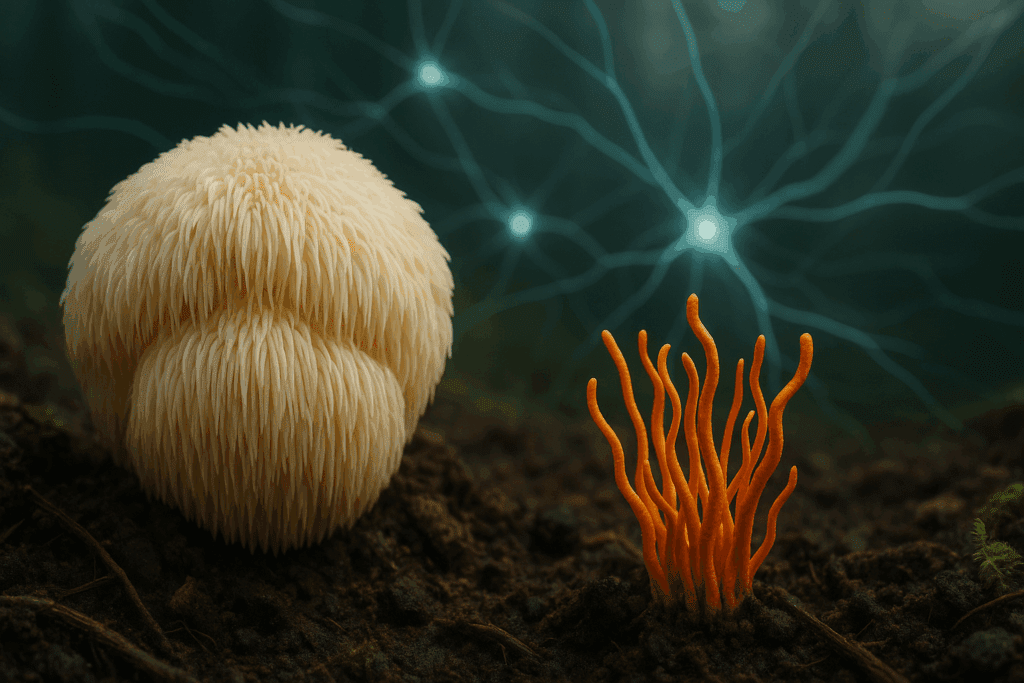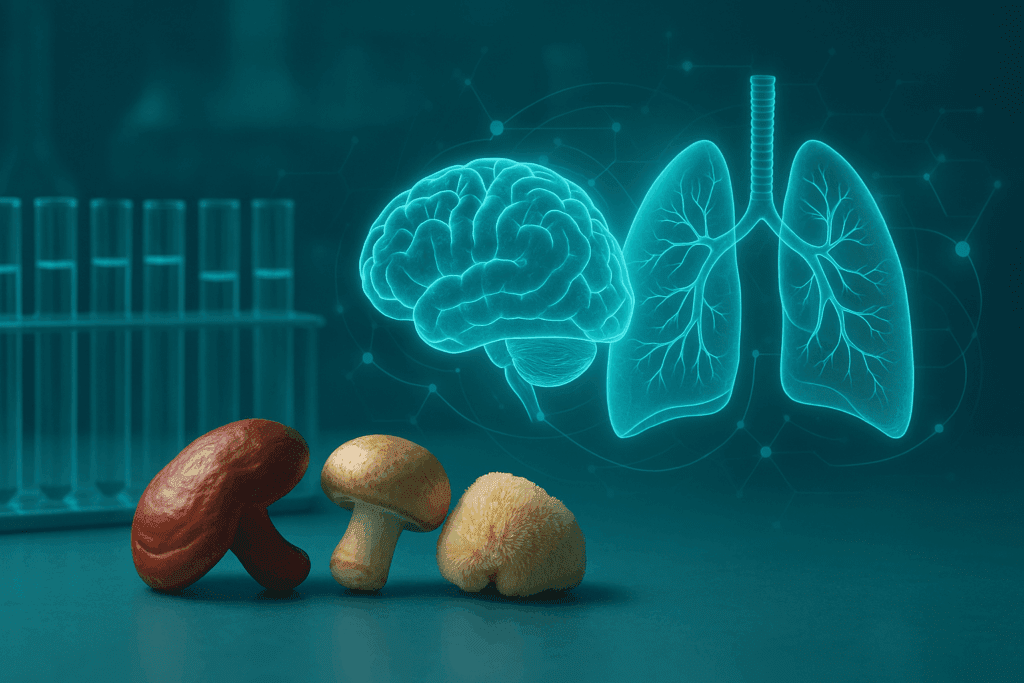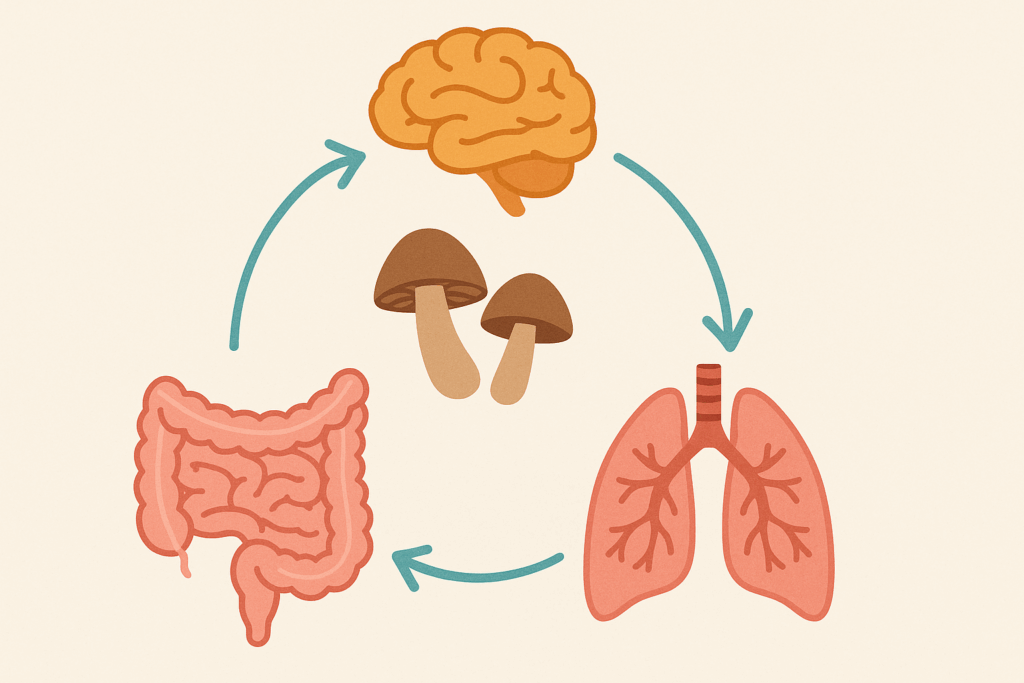Introduction: Bridging Brain and Breath Through Nootropic Mushrooms
In recent years, the rising interest in holistic health has led researchers and wellness enthusiasts alike to explore the symbiotic relationship between cognitive performance and respiratory wellness. Among the many natural substances gaining traction in this space are nootropic mushrooms, celebrated not only for their brain-boosting capabilities but also for their potential to enhance pulmonary function. These fungi, revered in traditional medicine and validated by emerging science, are becoming central to conversations about integrated health. Remarkably, the benefits of nootropic mushrooms for lung health are gaining scientific attention, as studies suggest that certain compounds within these fungi support both neurological clarity and respiratory resilience.
This duality is more than a coincidence—it’s a convergence of bioactive properties that offer protection, regeneration, and optimization at both cognitive and pulmonary levels. As respiratory illnesses, air pollution, and stress-induced cognitive decline continue to rise globally, exploring natural interventions becomes not just a curiosity but a necessity. This article delves deeply into how specific nootropic mushrooms influence brain function while supporting the respiratory system, unraveling the mechanisms behind these benefits and spotlighting the best mushroom for lungs backed by both ancient wisdom and modern science.
You may also like: The Ultimate Guide to the Best Nootropic Mushrooms for Memory and Cognitive Enhancement

Understanding Nootropic Mushrooms and Their Neuroprotective Potential
Nootropic mushrooms are a category of fungi known for enhancing cognitive function, memory, creativity, and overall brain health. Unlike synthetic nootropics, which often come with side effects, these natural counterparts provide a safer and more sustainable way to support mental clarity and neurological longevity. The bioactive compounds found in nootropic mushrooms—such as hericenones, erinacines, beta-glucans, and polysaccharides—interact with the nervous system in ways that promote neurogenesis, reduce inflammation, and improve synaptic plasticity.
One of the most well-known nootropic mushrooms is Lion’s Mane (Hericium erinaceus). Lion’s Mane has been extensively studied for its ability to stimulate the production of Nerve Growth Factor (NGF), a protein crucial for the maintenance and survival of neurons. Another is Cordyceps, which not only supports ATP production in cells (thereby increasing energy) but also enhances oxygen utilization, bridging the cognitive and respiratory systems.
The effects of these mushrooms extend beyond immediate cognitive benefits. Regular consumption has been linked to a reduction in oxidative stress, improved mood regulation, and even protection against neurodegenerative diseases. This is particularly significant for populations at risk of cognitive decline due to aging, chronic stress, or environmental factors. As more is understood about the connection between inflammation and brain fog, the anti-inflammatory properties of nootropic mushrooms become even more compelling.
Importantly, these mushrooms do not work in isolation. Their benefits are maximized when consumed as part of a balanced lifestyle that includes adequate nutrition, sleep, and mental engagement. As interest in cognitive enhancement grows among students, professionals, and the elderly alike, nootropic mushrooms offer a promising, accessible, and natural solution to sustaining brain power.

How Nootropic Mushrooms Support Lung Function
While much of the focus on nootropic mushrooms has centered on brain health, growing evidence suggests they can play a pivotal role in respiratory wellness as well. This connection is particularly pronounced in species like Cordyceps sinensis and Reishi (Ganoderma lucidum), both of which have a long history in Eastern medicine for treating respiratory ailments. Cordyceps, for example, is traditionally used to alleviate symptoms of chronic bronchitis, asthma, and other pulmonary conditions.
The mechanism behind these benefits lies in the mushrooms’ ability to increase oxygen uptake and enhance lung capacity. Cordyceps contains cordycepin, a nucleoside analog that helps increase the efficiency of oxygen transport in the blood. This results in improved stamina, energy, and breathing capacity, making it a favorite among athletes and individuals recovering from respiratory infections. Reishi, on the other hand, exerts its influence by modulating the immune system and reducing inflammation in the airways, thus easing the burden on the lungs.
In addition to their physiological impacts, nootropic mushrooms for lung health exhibit antioxidant properties that shield lung tissues from the damaging effects of pollutants, smoking, and oxidative stress. This is especially crucial in urban environments where air quality is a growing concern. The beta-glucans and triterpenes present in these mushrooms act as scavengers of free radicals, protecting the alveoli and bronchial pathways from cellular damage.
Furthermore, the adaptogenic nature of these mushrooms supports overall homeostasis. By regulating cortisol levels and reducing systemic inflammation, they create a cascade of benefits that enhance both respiratory and cognitive function. This dual-action support is particularly relevant in today’s context, where respiratory health and mental clarity are often compromised simultaneously due to chronic stress and environmental toxins.

The Science Behind Nootropic Mushrooms for Lung Health
Scientific studies exploring the effects of nootropic mushrooms for lung health are beginning to shed light on the mechanisms that underlie their dual-action benefits. Preclinical and clinical research has highlighted how compounds like polysaccharides and triterpenoids influence both the central nervous system and pulmonary function. For instance, animal studies involving Cordyceps have demonstrated improved oxygen utilization and increased lung ATP production, directly correlating with enhanced exercise performance and reduced fatigue.
Lion’s Mane, while best known for its neurological benefits, also shows promise in reducing inflammation markers that affect the entire body, including the respiratory system. Chronic inflammation is a known contributor to both cognitive dysfunction and respiratory issues such as chronic obstructive pulmonary disease (COPD). By mitigating inflammatory pathways, these mushrooms may offer protection against progressive lung decline.
Reishi has been the subject of numerous investigations due to its wide-ranging immunomodulatory effects. It has been shown to inhibit histamine release, a critical factor in asthma and allergic reactions, thereby reducing bronchial sensitivity. Moreover, its triterpenes possess anti-fibrotic properties, potentially preventing the scarring of lung tissue often seen in chronic pulmonary diseases.
Interestingly, the gut-lung-brain axis is an emerging area of study that further supports the use of nootropic mushrooms for holistic health. The bioactive compounds in mushrooms can modulate gut microbiota, which in turn influences both lung health and brain function through immune and neurological signaling pathways. This interconnected approach underlines the versatility and comprehensive potential of nootropic mushrooms.

Exploring the Best Mushroom for Lungs and Cognitive Vitality
Among the many medicinal mushrooms available, identifying the best mushroom for lungs and cognitive vitality requires an understanding of the synergistic effects each species offers. While Cordyceps stands out for its respiratory enhancement, Lion’s Mane is unparalleled in promoting neurogenesis. When combined, these mushrooms create a powerful blend that supports both brain clarity and lung efficiency.
Cordyceps is often considered the best mushroom for lungs due to its ability to improve aerobic capacity, reduce fatigue, and protect lung tissue from oxidative damage. Its capacity to enhance mitochondrial function and oxygen absorption makes it particularly effective for individuals with compromised respiratory function or those seeking to improve athletic performance.
Meanwhile, Lion’s Mane contributes to cognitive longevity through the stimulation of nerve regeneration and improved brain plasticity. Its potential to support memory and learning makes it highly beneficial for students, aging adults, and anyone dealing with cognitive fatigue. When respiratory health is compromised, cognitive function often suffers due to reduced oxygen delivery to the brain. This is where the dual action of these mushrooms becomes particularly advantageous.
Reishi deserves honorable mention as well. Its calming and anti-inflammatory effects help in conditions like asthma and allergic bronchitis, while its adaptogenic properties make it a valuable ally in reducing the impact of stress—a known factor in both cognitive decline and respiratory illness. Combining Reishi with other nootropic mushrooms can create a holistic regimen that nurtures mind and body resilience.
Turkey Tail (Trametes versicolor) also deserves attention for its immune-modulating and anti-inflammatory properties, which may indirectly support lung health by reducing systemic inflammation. Its polysaccharide-K (PSK) content has been studied for its antiviral effects and immune activation, making it a potential ally during respiratory infections that can compromise both lung and brain function.
Integrating Nootropic Mushrooms for Lung Health Into Daily Life
Incorporating nootropic mushrooms for lung health into one’s lifestyle need not be complex. These mushrooms are now widely available in various forms—capsules, tinctures, powders, teas, and even culinary additions. The key lies in consistency and quality. Selecting high-grade, organic mushroom supplements ensures maximum potency and bioavailability of active compounds.
One of the easiest ways to consume these mushrooms is through adaptogenic blends that combine multiple species. For instance, a morning tonic that includes Cordyceps and Lion’s Mane can provide both energy and mental clarity for the day ahead. Evening teas with Reishi can promote relaxation, improve sleep quality, and support overnight cellular repair, which is crucial for both lung and brain recovery.
Culinary applications are also gaining popularity. Lion’s Mane, with its meaty texture and savory taste, can be sautéed or incorporated into soups and stir-fries. Cordyceps and Reishi powders can be added to smoothies, coffees, or broths for a functional health boost without altering flavor significantly. These integrations not only make consumption enjoyable but also align with a food-as-medicine approach.
It is important to note that while these mushrooms are generally safe, they may interact with medications or underlying conditions. Consulting with a healthcare provider is recommended, especially for individuals with autoimmune diseases, those on immunosuppressants, or anyone managing chronic respiratory issues. Personalized guidance ensures that these supplements complement existing health strategies without causing adverse effects.
Lifestyle synergy enhances the effects of nootropic mushrooms. Pairing their use with mindful breathing exercises, aerobic activity, and anti-inflammatory diets can magnify their impact on lung capacity and cognitive performance. Regular use in conjunction with healthy habits creates a foundation for sustainable wellness.

Nootropic Mushrooms and the Gut-Lung-Brain Axis: A New Frontier in Functional Health
The complex interplay between the gut, lungs, and brain is gaining recognition as a pivotal determinant of overall health, particularly in the realm of inflammation, immunity, and cognitive function. This gut-lung-brain axis suggests that the health of one system can significantly influence the others, establishing a network of communication via neural, endocrine, and immunological pathways. Nootropic mushrooms—rich in prebiotic fibers and anti-inflammatory compounds—are increasingly understood to be powerful modulators within this triad.
Certain mushrooms such as Turkey Tail contain polysaccharide compounds like PSP and PSK that support a balanced gut microbiome by fostering the growth of beneficial bacteria. A healthy microbiome, in turn, produces short-chain fatty acids and other metabolites that influence lung and brain health through systemic anti-inflammatory signaling. These microbial interactions may help to regulate immune responses, reducing hyperinflammation that could otherwise exacerbate respiratory issues or contribute to cognitive fog.
Beyond microbiome modulation, the antioxidant properties of nootropic mushrooms help to reduce oxidative stress systemically, including in lung and brain tissues. This stress reduction plays a key role in chronic conditions such as asthma, Alzheimer’s disease, and even anxiety disorders, all of which are marked by inflammation and disrupted signaling pathways. By supporting mitochondrial efficiency and modulating cytokine activity, mushrooms help restore cellular function and communication across these interlinked systems.
The adaptogenic traits of mushrooms such as Reishi further strengthen their role in supporting this axis. By mitigating the physiological effects of stress—such as elevated cortisol and inflammation—they indirectly support respiratory ease and mental clarity. This makes nootropic mushrooms an attractive therapeutic food for people managing stress-related breathing issues or cognitive dysfunction.
These findings emphasize the importance of approaching health from a systems biology perspective, where interventions target multiple interconnected areas. Nootropic mushrooms for lung health are not just localized solutions; they are systemic adaptogens that address the root imbalances affecting the gut, the lungs, and the brain simultaneously.
Long-Term Impacts of Nootropic Mushrooms for Lung Health on Cognitive Aging
As global populations age and neurodegenerative diseases like Alzheimer’s and Parkinson’s become more prevalent, interest in natural interventions that can slow or prevent cognitive decline is intensifying. While cognitive aging is influenced by genetics and environmental factors, one underappreciated aspect is the role of oxygen availability and respiratory efficiency in maintaining brain health. The use of nootropic mushrooms for lung health introduces a novel preventive strategy that targets the respiratory-cognitive connection at its root.
Oxygen is fundamental to brain function, fueling cellular respiration and energy production in neurons. Chronic respiratory insufficiency or poor lung health can reduce oxygen saturation in the blood, impairing cognitive function over time. This is especially relevant for older adults, who often experience both decreased lung capacity and declining mental acuity. By enhancing oxygen uptake, improving lung tissue resilience, and reducing pulmonary inflammation, mushrooms such as Cordyceps and Reishi help to maintain the oxygen supply that the brain critically depends on.
In addition to improving oxygenation, these mushrooms exert neuroprotective effects that are especially beneficial in aging populations. Lion’s Mane, for example, promotes the regeneration of nerve cells and the synthesis of NGF, supporting not only memory and focus but also the repair of age-related neuronal damage. When the brain receives sufficient oxygen and the nervous system is protected from inflammation and degeneration, the trajectory of cognitive aging can be significantly improved.
Emerging evidence also suggests that the antioxidants in mushrooms protect against the oxidative stress commonly seen in age-related diseases. This oxidative damage, if unmitigated, leads to neuronal apoptosis and the accumulation of neurotoxic proteins such as beta-amyloid plaques. Regular consumption of nootropic mushrooms may inhibit these processes, potentially delaying the onset of dementia-related conditions.
Taken together, the respiratory and neurological support provided by these mushrooms represents a compelling, holistic approach to healthy aging. By incorporating nootropic mushrooms for lung health into a long-term wellness plan, individuals can take proactive steps to safeguard both their cognitive function and pulmonary vitality well into older adulthood.

The Role of Mushrooms for Lung Health in Athletic Performance and Mental Focus
Athletes, fitness enthusiasts, and individuals with high physical demands often face challenges that strain both the respiratory and cognitive systems. Whether it’s endurance sports, high-intensity training, or competitive performance, the body’s need for oxygen efficiency and mental sharpness is paramount. In this high-demand context, mushrooms for lung health provide an edge that goes beyond conventional supplements.
Cordyceps has garnered significant attention in the athletic world due to its ability to enhance VO2 max—the maximum rate of oxygen consumption during exercise. Studies have shown that Cordyceps supplementation improves aerobic performance, delays fatigue, and supports faster recovery. These benefits stem from its influence on mitochondrial ATP production, increased lung capacity, and improved blood oxygenation. These enhancements are particularly valuable for runners, swimmers, cyclists, and others engaging in sustained physical exertion.
Mental focus is another area where nootropic mushrooms shine. Athletes must maintain concentration, strategic thinking, and emotional regulation under stress. Lion’s Mane, with its effects on neurogenesis and synaptic plasticity, helps improve cognitive flexibility and processing speed, enabling better decision-making during competition. The clarity and calm promoted by Reishi further enhance mental endurance, particularly in high-stress scenarios such as competitive games or long-distance races.
Respiratory recovery is also crucial for athletic longevity. Inflammation, asthma-like symptoms, and oxidative stress can impair performance and delay recovery. Reishi’s anti-inflammatory effects, coupled with the immune-modulating capabilities of Turkey Tail, make them ideal for maintaining respiratory health during intensive training periods. These mushrooms also help modulate immune response, reducing the likelihood of overtraining syndrome and related illnesses.
By addressing both physical stamina and mental acuity, mushrooms for lung health provide athletes with a holistic performance tool. Their natural, adaptogenic properties make them suitable for consistent use without the risks associated with stimulants or synthetic enhancers. As functional mushrooms continue to gain popularity in sports nutrition, their dual support of lungs and brain positions them as vital components of any performance optimization regimen.

Practical Applications in Modern Wellness and Preventive Medicine
The relevance of nootropic mushrooms for lung health extends into the broader domains of preventive medicine and public health. In an era marked by respiratory pandemics, increasing pollution, and escalating mental health challenges, natural compounds that support dual systems are invaluable. These mushrooms not only address symptoms but also work at the root level to restore balance and function.
In clinical settings, functional medicine practitioners are beginning to incorporate nootropic mushrooms into treatment protocols for patients dealing with chronic fatigue, mild cognitive impairment, and inflammatory lung conditions. Their multi-targeted approach offers a complement to conventional treatments, filling the gaps left by symptom-focused pharmaceuticals.
Workplace wellness programs can also benefit from integrating mushroom-based cognitive and respiratory support. Employees facing high cognitive demands and sedentary lifestyles with poor air quality exposure may experience improvements in mental clarity, productivity, and immune resilience through regular supplementation. Educational institutions, athletic programs, and elder care facilities represent additional environments where these natural interventions can make a significant difference.
Moreover, emerging research into the effects of these mushrooms on neuroplasticity and pulmonary fibrosis may pave the way for novel therapies. The potential to influence epigenetic expression and tissue regeneration positions nootropic mushrooms as not just supplements, but as agents of healing and transformation in integrative healthcare.
As global awareness grows around the importance of mental and respiratory well-being, these fungi stand poised to play a central role in personalized wellness strategies. Their accessibility, minimal side effects, and compatibility with other interventions make them an ideal choice for forward-thinking healthcare models.
Frequently Asked Questions About the Surprising Cognitive Benefits of Nootropic Mushrooms for Lung Health
1. What makes mushrooms for lung health effective for people living in polluted environments?
Nootropic mushrooms for lung health are particularly beneficial for individuals exposed to air pollution due to their potent antioxidant and anti-inflammatory compounds. Urban environments often contain airborne pollutants such as nitrogen dioxide, ozone, and particulate matter that irritate the respiratory tract and accelerate oxidative damage. Mushrooms like Cordyceps and Reishi have been shown to protect the lungs at the cellular level by neutralizing free radicals and supporting immune function. Additionally, these mushrooms may help reinforce the epithelial lining of the lungs, enhancing resistance to external toxins. This protective effect makes them a compelling choice for city dwellers or those working in high-exposure industries.
2. How do nootropic mushrooms interact with conventional medications for respiratory conditions?
While nootropic mushrooms offer a wide range of respiratory benefits, it’s essential to consider potential interactions with prescription medications. For example, Reishi has blood-thinning properties, which may amplify the effects of anticoagulants like warfarin. Similarly, Cordyceps may enhance the effects of immunosuppressants, creating complications for individuals on immune-regulating drugs. Therefore, it’s crucial for patients to consult with their healthcare provider before incorporating mushrooms for lung health into their routine. When properly managed, these mushrooms can complement medical treatments by reducing inflammation and enhancing energy without replacing critical therapies.
3. Can incorporating mushrooms for lung health improve sleep quality as well?
Yes, some nootropic mushrooms for lung health, especially Reishi, have adaptogenic properties that indirectly contribute to better sleep. By calming the nervous system and reducing cortisol levels, Reishi helps the body transition into a restful state more easily. Improved respiratory efficiency also leads to better oxygenation during sleep, which supports deeper and more restorative rest. Chronic respiratory issues often interfere with sleep patterns, and addressing these issues with functional mushrooms can lead to noticeable improvements in sleep hygiene. This dual benefit is especially valuable for those dealing with sleep-disordered breathing or stress-related insomnia.
4. What are some lesser-known species beyond the best mushroom for lungs?
While Cordyceps is often hailed as the best mushroom for lungs, other lesser-known varieties are gaining traction for their unique contributions. Agaricus blazei, for instance, contains high levels of beta-glucans that stimulate macrophage activity in the lungs. Chaga is another underutilized option with powerful antioxidant potential that may mitigate oxidative stress linked to chronic respiratory conditions. These lesser-known mushrooms offer niche respiratory and immune benefits that may appeal to those looking for alternatives or additions to more mainstream options. They may not replace the best mushroom for lungs but serve as useful allies in a diverse supplement strategy.
5. Are there specific benefits of mushrooms for lung health in post-COVID recovery?
Post-COVID recovery often involves lingering respiratory and neurological symptoms, and mushrooms for lung health offer promising support for both. Cordyceps, with its ability to enhance oxygen uptake, may aid individuals experiencing breathlessness or reduced stamina after infection. Lion’s Mane supports cognitive recovery by promoting nerve repair and reducing brain fog—a common long COVID complaint. Reishi can stabilize immune response, preventing inflammatory flare-ups that sometimes occur post-infection. When combined, these mushrooms provide a comprehensive recovery toolkit to restore both respiratory resilience and mental clarity in the aftermath of illness.
6. How do nootropic mushrooms affect psychological resilience during chronic respiratory illness?
Living with a chronic respiratory condition can lead to psychological strain, including anxiety, depression, and cognitive fatigue. Nootropic mushrooms offer indirect but meaningful psychological support by modulating the hypothalamic-pituitary-adrenal (HPA) axis and improving oxygen delivery to the brain. Reishi and Lion’s Mane, in particular, have mood-stabilizing effects that can enhance emotional balance and cognitive focus during difficult health periods. Additionally, the sense of empowerment that comes from incorporating a natural, proactive health tool can also improve patients’ mental outlook. Thus, these mushrooms address not only the biological but also the emotional burdens of chronic lung conditions.
7. Can athletes benefit from using mushrooms for lung health in high-altitude training?
Athletes training at high altitudes often struggle with reduced oxygen availability, making mushrooms for lung health especially useful. Cordyceps can enhance cellular oxygen absorption, making it easier to perform under low-oxygen conditions. This increased efficiency helps athletes acclimate faster, reduce fatigue, and maintain performance. Additionally, Reishi may help manage the inflammatory response triggered by extreme training, reducing recovery time. These effects position mushrooms as performance-enhancing allies that support both endurance and long-term respiratory adaptation.
8. How do dietary habits influence the effectiveness of mushrooms for lung health?
The bioavailability of active compounds in nootropic mushrooms can be enhanced by pairing them with the right dietary practices. Consuming mushrooms with healthy fats, such as those found in avocado or olive oil, can improve the absorption of fat-soluble triterpenes. Moreover, an anti-inflammatory diet rich in colorful vegetables and omega-3 fatty acids can synergize with the immune-supporting effects of mushrooms for lung health. Avoiding processed sugars and trans fats helps reduce systemic inflammation, allowing mushrooms to work more effectively. Thus, dietary context plays a crucial role in optimizing the benefits of functional fungi.
9. What emerging technologies are improving the quality and efficacy of mushroom supplements?
Recent innovations in extraction and formulation are significantly enhancing the efficacy of mushrooms for lung health. Dual-extraction methods—using both alcohol and hot water—capture a broader range of active compounds, from beta-glucans to triterpenoids. Nanoemulsion and liposomal delivery systems are also emerging, offering improved absorption and faster onset of effects. Some companies now use DNA authentication to ensure strain purity and potency, increasing consumer trust and product reliability. These advances are helping to transform traditional mushroom remedies into precision tools in the modern wellness industry.
10. Could mushrooms for lung health play a role in community health initiatives?
Yes, mushrooms for lung health could be incorporated into broader public health strategies, especially in underserved or pollution-prone communities. Community gardens and educational programs could teach residents to cultivate and utilize medicinal mushrooms, promoting self-sufficiency and local resilience. This approach would be particularly effective in areas with limited access to conventional healthcare or those suffering from environmental health disparities. Integrating mushrooms into school lunches, wellness clinics, and food cooperatives could also improve population-level outcomes. Such initiatives would not only democratize access to functional medicine but also foster a deeper cultural appreciation for natural health solutions.
Conclusion: Unlocking the Dual Power of Mushrooms for Lung and Brain Vitality
As the scientific and holistic communities continue to converge in their understanding of integrative health, the potential of nootropic mushrooms for lung health emerges as a powerful, evidence-supported avenue for dual-system optimization. These remarkable fungi, long valued in ancient medicine, are now being reexamined through the lens of modern research—and the findings are compelling.
Cordyceps, Lion’s Mane, Reishi, and Turkey Tail each offer a unique profile of benefits that support both cognitive function and pulmonary wellness. Together, they form a versatile, synergistic toolkit for addressing the interwoven challenges of brain fog, poor concentration, shortness of breath, and reduced resilience in the face of stress and environmental harm. Their ability to modulate inflammation, improve oxygen utilization, stimulate neurogenesis, and support immune function illustrates the multifaceted power of fungi in health maintenance and disease prevention.
For those seeking to improve their mental clarity while also enhancing their breathing and physical vitality, these mushrooms present a scientifically validated and naturally sourced solution. Incorporating nootropic mushrooms for lung health into daily routines—through teas, supplements, or functional foods—can serve as a proactive step toward whole-body resilience. As the fields of neuroscience, pulmonology, and nutrition increasingly overlap, the humble mushroom may well become one of the most transformative allies in our pursuit of lifelong vitality.
In the end, the wisdom of the past and the rigor of modern science converge in these unassuming organisms, offering not just symptom relief but foundational support for the systems that keep us thinking, breathing, and thriving.
